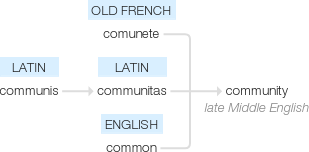Community
late Middle English: from Old French comunete, reinforced by its source, Latin communitas, from communis (see common).
wiktionary
From Late Middle English communite, [1] borrowed from Old French communité, comunité, comunete (modern French communauté), from Classical Latin commūnitās(“community; public spirit”), [2] from commūnis(“common, ordinary; of or for the community, public”) + -itās (ultimately from Proto-Indo-European *-teh₂ts(“suffix forming nouns indicating a state of being”)). Commūnis is derived from con-(“prefix indicating a being or bringing together of several objects”) (from cum(“with”), ultimately from Proto-Indo-European *ḱóm(“along, at, next to, with”)) + mūnus(“employment, office, service; burden, duty, obligation”) (ultimately from Proto-Indo-European *mey-(“to change, exchange”)). Ostenibly equivalent to commune + -ity. Doublet of communitas.
etymonline
community (n.)
late 14c., "a number of people associated together by the fact of residence in the same locality," also "the common people" (not the rulers or the clergy), from Old French comunité "community, commonness, everybody" (Modern French communauté), from Latin communitatem (nominative communitas) "community, society, fellowship, friendly intercourse; courtesy, condescension, affability," from communis "common, public, general, shared by all or many" (see common (adj.)).
Latin communitatem "was merely a noun of quality ... meaning 'fellowship, community of relations or feelings' " [OED], but in Medieval Latin it came to be used concretely to mean "a society, a division of people." In English, the meaning "common possession or enjoyment" is from c. 1400. Sense of "a society or association of persons having common interests or occupations" also is from c. 1400.
An Old English word for "community" was gemænscipe "community, fellowship, union, common ownership," from mæne "common, public, general," and thus probably composed from the same PIE roots as communis. Middle English also had commonty (late 14c.) "the common people; a community," also later meaning "land held in common" (c. 1600).
Community service as a criminal sentence is recorded from 1972, American English. Community college, one offering post-secondary instruction geared to local needs and interests, is recorded from 1947, American English. Community chest "fund made up of individual donations to meet the needs of charity and social welfare in a community" is from 1919, American English.
The Community Chest is a device to consolidate all these separate [charitable] appeals, and go before the people once a year with a budget which appropriates to each organization the amount which it needs to make up the difference between its income from other sources, and its necessary expenses. By this means not only are the charities relieved of financial worry and adequately supported, but the public is spared the irritation of constant solicitation, which is all the more unbusinesslike because it is decentralized and not subject to outside disinterested scrutiny. ["New Jersey Municipalities," December 1919]
